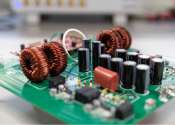Method identified to double computer processing speeds
Imagine doubling the processing power of your smartphone, tablet, personal computer, or server using the existing hardware already in these devices.
Feb 22, 2024
0
70
Hardware

Imagine doubling the processing power of your smartphone, tablet, personal computer, or server using the existing hardware already in these devices.
Feb 22, 2024
0
70
Electronics & Semiconductors

Monitoring sweat-related dynamics, such as sweat rate, cumulative sweat loss and sweat temperature over time could help doctors to diagnose thermoregulatory disorders and other illnesses related to heat stress. However, there ...
Business

Japanese electronics giant Panasonic said Thursday it was exiting the semiconductor business, selling its loss-making subsidiary to a Taiwanese firm as it struggles with intense competition from China and South Korea.
Nov 28, 2019
0
2969
Hardware

Next-generation electronic devices could feature enhanced security systems built directly into their circuitry to help fend off malicious attacks. Protective "logic locks"—based on an advanced branch of electronics called ...
Nov 15, 2022
0
72
Consumer & Gadgets

Apple Inc. has applied for a patent on a bendable phone that also has self-healing display technology. The company applied for the patent last year and it has just recently been made public.
Engineering

Researchers at Kyushu University, the National Institute of Advanced Industrial Science and Technology (AIST) and Osaka University in Japan have recently introduced a new strategy for synthesizing multi-layer hexagonal boron ...
Electronics & Semiconductors

Faster, smaller, smarter and more energy-efficient chips for everything from consumer electronics to big data to brain-inspired computing could soon be on the way after engineers at The University of Texas at Austin created ...
Nov 23, 2020
0
215
Robotics

Nature is one of the greatest sources of inspiration for engineers and computer scientists developing new technological tools. Over the past decade or so, roboticists have developed countless robots inspired by the behavior ...
Electronics & Semiconductors

Machine learning architectures based on convolutional neural networks (CNNs) have proved to be highly valuable for a wide range of applications, ranging from computer vision to the analysis of images and the processing or ...
Electronics & Semiconductors

A new DC-DC power converter is superior to previous designs and paves the way for more efficient, reliable and sustainable energy storage and conversion solutions. The Kobe University development can efficiently interface ...
Apr 19, 2024
0
17
Electronics is a branch of science and technology that deals with the flow of electrons through nonmetallic conductors, mainly semiconductors such as silicon. It is distinct from electrical science and technology, which deal with the flow of electrons and other charge carriers through metal conductors such as copper. This distinction started around 1906 with the invention by Lee De Forest of the triode. Until 1950 this field was called "radio technology" because its principal application was the design and theory of radio transmitters, receivers and vacuum tubes.
The study of semiconductor devices and related technology is considered a branch of physics, whereas the design and construction of electronic circuits to solve practical problems come under electronics engineering. This article focuses on engineering aspects of electronics.
This text uses material from Wikipedia, licensed under CC BY-SA